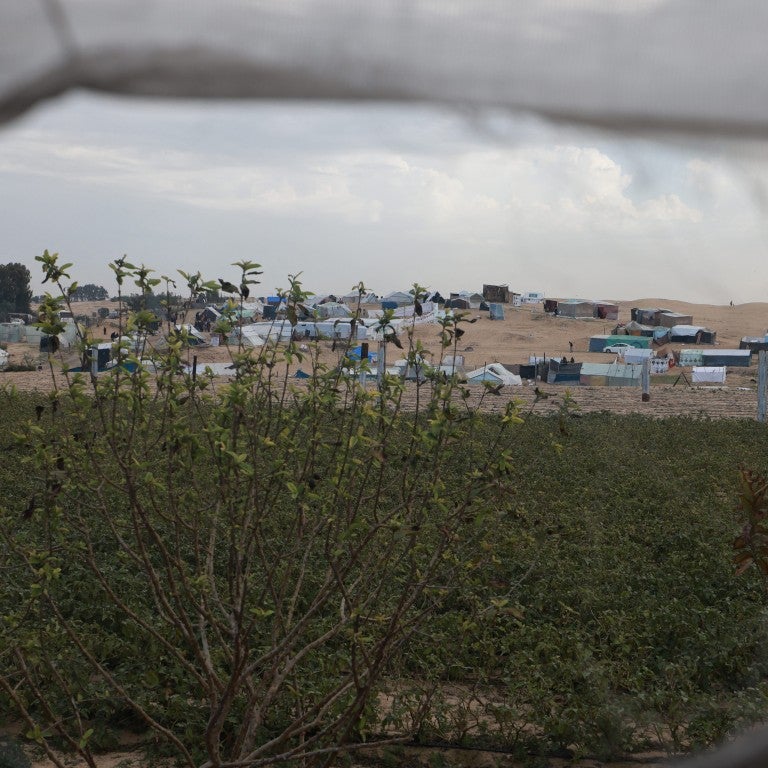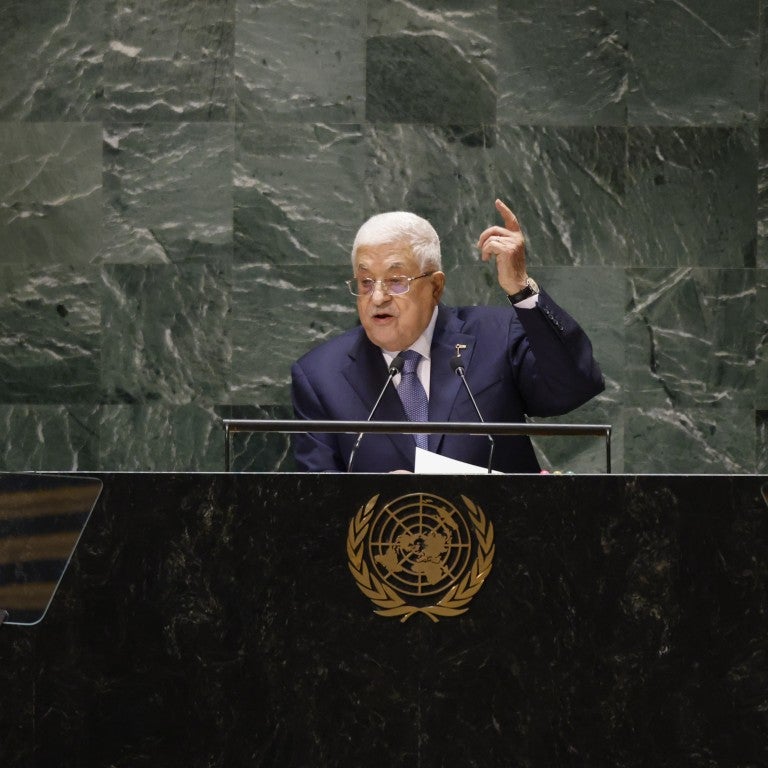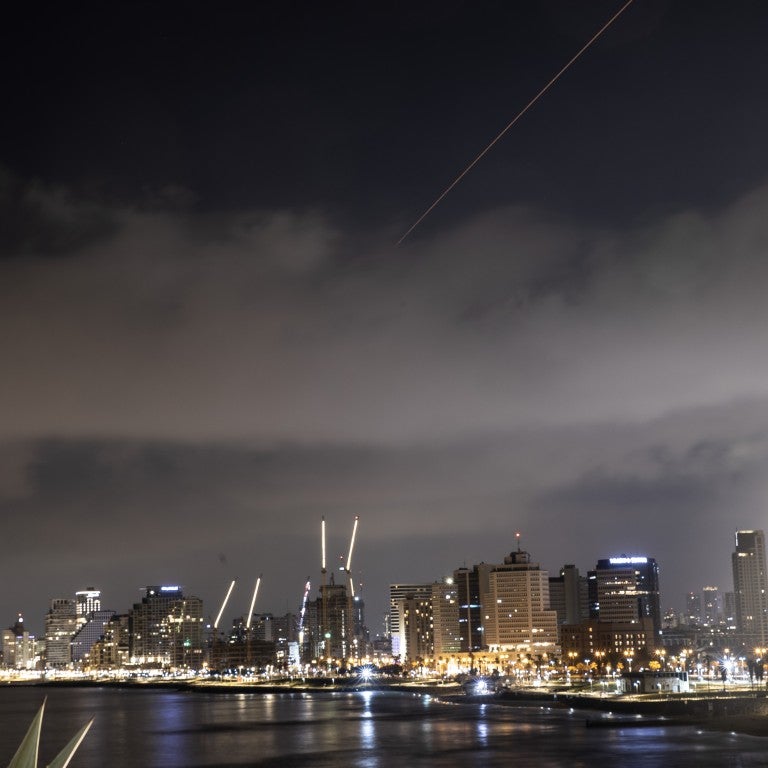May 23, 2024
Adding another dangerous twist to the Israel-Hamas War and its impact, the prosecutor of the International Criminal Court (ICC) has announced he is simultaneously seeking arrest warrants for Israeli Prime Minister Benjamin Netanyahu and Defense Minister Yoav Gallant, along with three leaders of the genocidal terror group Hamas.
News of the effort to seek the arrest warrants broke on Monday when Prosecutor Karim Khan announced, via an interview with CNN’s Christiane Amanpour, he had filed applications for arrest warrants for Hamas’ leader in Gaza Yahya Sinwar, along with other Hamas officials including Mohammed Diab Ibrahim al-Masri, the leader of the Al Qassem Brigades, and Ismail Haniyeh, Hamas’ political leader, for the war crimes and crimes against humanity of extermination, murder, taking of hostages, rape and sexual violence, torture, and other inhumane acts following the October 7 terror attack on Israel.
Prosecutor Khan also announced he was seeking warrants for Netanyahu and Gallant for war crimes and crimes against humanity including extermination, persecution, causing starvation as a method of war, including the denial of humanitarian relief supplies, and intentionally targeting civilians in its effort to defeat Hamas.
AJC condemned the accusations against the Israeli leaders, saying they were “slanderous, factually unsupported, and contribute to a broader effort to demonize the State of Israel and the Israeli people.”
“This effort is a moral outrage based on blatant falsehoods that will harm the Court’s credibility, completely undermine its core mandate, and embolden enemies of democracies around the world,” AJC said in a statement. Read the full statement here.
Here’s what you need to know about the ICC, its history and powers, and how this will affect the Israel-Hamas war.
Why is this a dangerous development in the Israel-Hamas War?
Some have argued that ICC Prosecutor Khan’s action will incentivize all parties to the conflict in Gaza to obey international law - but they are engaged in dangerous wishful thinking. Hamas is unlikely to be deterred, politically or financially, and its leaders’ travel plans are unlikely to be constrained more than they already are by the prospect of future arrest by an ICC State party.
At the same time, Prosecutor Khan’s pursuit of simultaneous warrants against Hamas leaders and Israeli leaders is deeply offensive, as it projects a false equivalence between leaders of a democratic country and leaders of a genocidal terror organization.
To the extent that the ICC warrants assume that Israel’s military campaign against Hamas must have been intended to cause innocent civilians harm, it is blatantly false and dangerous. Like every nation, Israel has the inherent right of self-defense enshrined in Article 51 of the UN Charter.
The Prosecutor’s latest actions demonize Israel. As we’ve seen since October 7, rather than advancing the prospects of justice for victims of atrocities, the primary effect of his actions likely will be to fuel antisemitic attitudes and increase the danger facing many Jews around the world.
What is the International Criminal Court?
The International Criminal Court (ICC) is an independent international judicial tribunal based in The Hague. It was established in 2002 by the Rome Statute, a treaty that spells out what crimes the ICC should investigate and adjudicate and when it can do so. The ICC can prosecute individuals for four main categories of crimes: war crimes, crimes against humanity, genocide, and aggression. Importantly, the ICC can investigate and prosecute not only State actors but also non-state actors like the leaders of Hamas.
Considered a court of last resort, the ICC adjudicates when national legal systems fail to prosecute such crimes—a principle of complementarity that respects the role of independent judiciaries in sovereign states.
Is the International Criminal Court part of the United Nations?
The ICC should not be confused with the International Criminal Court of Justice (ICJ), the judicial arm of the United Nations. The ICJ settles legal disputes between states and issues advisory opinions upon request by UN entities.
Like the ICC, the ICJ only has limited jurisdiction over certain situations. Israel has been compelled to participate in ICJ proceedings concerning a complaint against it brought by South Africa because both States are parties to the Genocide Convention, a treaty that gives the ICJ jurisdiction to settle disputes about its enforcement. “Palestine” has not signed the Genocide Convention, and Hamas cannot do so as a non-State actor, so neither can be a party to that ICJ case.
Is Israel a member of the ICC?
Israel is not a member, or what’s called a “State party,” of the ICC, though it did play an important role in negotiations during the drafting of the Rome Statute. But at the end of the day, Israel did not sign the Rome Statute and join the ICC. Why? The ICC was intended to focus on the most heinous crimes including genocide and crimes against humanity. But, urged by a number of Arab countries, a majority of countries agreed to add the transfer of civilians into an occupied territory to the list of crimes the Court would have jurisdiction to prosecute. Israel’s diplomats objected that States were distorting international law and not mirroring the language of the Geneva Convention in order to specifically prosecute Israelis for actions in the West Bank.
The U.S. also played a significant role in the Rome Statute negotiations but ultimately did not join the ICC, citing concerns that it would be politicized and used to target American officials for U.S. actions overseas, undermining U.S. national sovereignty.
Can the ICC prosecute the State of Israel?
No, the ICC only prosecutes individuals, not states.
Can the ICC prosecute Israelis?
In short, it is a question of jurisdiction.
Israeli officials have vigorously rejected the ICC’s authority to investigate or try Israelis for actions in Gaza or the West Bank. Israel is not alone: countries including the U.S. and the United Kingdom have also insisted that the ICC does not have jurisdiction over Israelis in this case. AJC agrees with this position.
However, the Palestinians and the ICC see it differently.
One way the ICC can gain jurisdiction is if a State asks the ICC Prosecutor to investigate a situation on its own territory, thereby delegating to international authorities its own sovereign power to investigate.
Since 2009, Palestinians have been pursuing this route and asking the ICC to investigate the situation in the territory of “the State of Palestine.” But at no point has the UN Security Council accepted Palestine’s requests for UN Member State status (in fact, it has twice declined it), with States like the U.S. stressing the lack of essential State attributes like an effective government, given that Hamas controls Gaza. Nor has the UN Secretariat ever actually determined that “Palestine” has the legal capacity of a State.
Instead, the UN General Assembly adopted a resolution in 2012 making the “State of Palestine” a “non-member observer State.” This status upgrade enabled the Palestinian Authority (PA) to begin signing international treaties over which the United Nations is the custodian, including the Rome Statute.
In February 2021, the pre-trial chamber of the Court determined that the ICC did have jurisdiction over Israel, Gaza, and the West Bank, based on the 2012 UNGA resolution and the UN’s acceptance of Palestine’s treaty signatures.
Meanwhile, it said it had no authority to assess whether Palestine was, in fact, a State that could turn to the ICC for adjudication, but allowed a full investigation to open anyway. It also suggested that the issue of jurisdiction could be revisited should the Prosecutor seek arrest warrants, laying the groundwork for the controversy that has erupted now.
In addition, there is no question that Hamas celebrates its leaders’ international crimes against Israelis and has no intention of holding them accountable. But unlike the Palestinian Authority and Hamas, Israel has an independent judiciary capable of addressing any alleged illegal acts committed by members of its military force.
In fact, since the beginning of the conflict, Israel's Military Advocate General has opened 55 criminal investigations; its Fact Finding and Assessment Mechanism is simultaneously addressing hundreds of incidents; and Israel’s law enforcement agencies are examining dozens of statements made and recently decided that some cases justify the promotion of criminal proceedings.
That factor alone should have led the Prosecutor to decline to seek warrants against Israelis.
What is Israel’s response to the ICC prosecutor’s claims?
Israel has vehemently rejected the ICC prosecutor’s claims that the IDF’s campaign in Gaza is aimed at intentionally harming Palestinian civilians.
Israel’s defensive war, launched after Hamas’ brutal October 7 attack, during which more than 1,200 people were murdered, thousands injured, and more than 250 kidnapped, has been carried out utilizing a military code of conduct that strives to protect civilian life. That civilians have been harmed anyway is a deeply regrettable consequence of Hamas’ lawless tactics, not evidence of Israel’s criminal intent.
What is the international community’s response?
Outrageous, unacceptable, non-comprehensible, and appalling. Those were the words used by world leaders to describe the ICC’s simultaneous pursuit of arrest warrants for leaders of a democratic country and a terrorist group.
U.S. President Joe Biden expressed outrage at the decision. “Whatever this prosecutor might imply, there is no equivalence – none – between Israel and Hamas,” Biden said on Monday. Secretary of State Antony Blinken added: “the United States has been clear since well before the current conflict that the ICC has no jurisdiction over this matter” and expressed concern that the ICC prosecutor’s decision could complicate the process of reaching a deal to secure a ceasefire and the release of hostages.
Prime Minister of the Czech Republic Petr Fiala called the false equivalence of a democratically elected government and a terror organization “appalling and completely unacceptable.”
Austrian Chancellor Karl Nehammer called it “non-comprehensible.”
Polish Prime Minister Donald Tusk said for an international institution to engage in such a comparison is unacceptable.
French Foreign Minister Sephanie Sejourne said that people should not draw an “equivalence” between Israel and Hamas leaders.
Germany’s Foreign Office said “The Court will have a host of difficult questions to answer here, including in particular the question as to its jurisdiction and the complementarity of investigations carried out by affected states governed by the rule of law, which include Israel. The simultaneous applications for arrest warrants for the Hamas leadership on the one hand and the two Israeli officials on the other have resulted in an incorrect implication of equivalence.”
UK Prime Minister Rishi Sunak’s spokesperson said: “"This action is not helpful in relation to reaching a pause in the fighting, getting hostages out or getting humanitarian aid in” and "As we have said from the outset, we do not think the ICC has jurisdiction in this case.”





